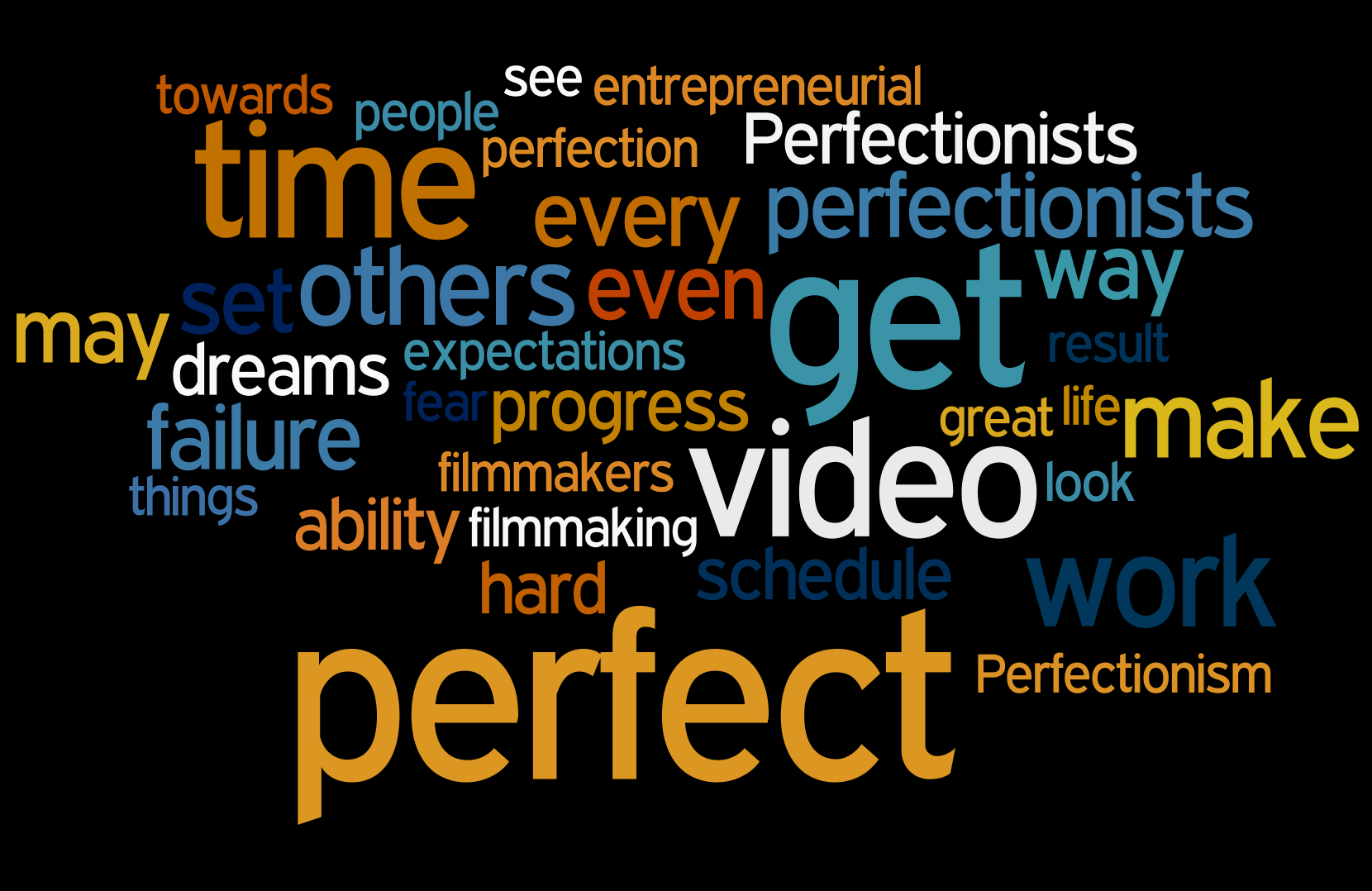
Humans are endowed with the ability to create, innovate and to make extraordinary things happen. We also have the capacity and ability to dream, set goals and execute actions. These processes collectively can transform the world and those who are able to utilize them can actively recognize the ability to perform great things and use it effectively. The other set of people, however, are those who do not recognize the ability they have.
Yet, there is a third set – The Perfectionists.
Perfectionists are those who understand the outstanding potential they have but fail to have it explored because they have the fear of making mistakes. Perfectionists may be seen as people who aren’t pleased with anything that fails to meet high standards. We all know the stereotypical emo-filmmaker that will just die if his or her film isn’t perfect in every way.
Here’s the thing:
Believing in perfectionism does more harm than good to the progress of an aspiring entrepreneurial filmmaker!
In reality, perfection does not really exist. Nothing in this world is in a state of 100% accuracy or flawlessness as every entity in one way or the other requires further improvements. Nothing could be more true than the subjective opinion about filmmaking. We all have to face the reality that we are likely not the next Martin Scorsese, George Lucas, Stanley Kubrick or even Woody Allen – but WHO CARES? You can “learn to earn” and entrepreneurial filmmakers should most often be concerned about the client rather than the art! That’s the fundamental difference between being a filmmaker and being a video entrepreneur.
The impossible-to-achieve “state of perfection” drags great dreams, ideas and businesses down to a perfect grave!
THE PROBLEM WITH PERFECTION
Generally speaking, the perfectionists I’ve watched try to start any meaningful project often have trouble with focusing on their priorities. They get obsessed about minor details and go compulsive about things that are meant to be of secondary importance and this manifests itself in other ways – like fear of being in front of a camera for instance. When they put too much pressure on themselves about how they look, what people might think about them, the possibility of failure and their expectations of others, all work comes to a halt.
The belief of perfectionists is: ‘If it is not perfect, it is bad’ and ‘If I can’t get to do it right, I won’t make any attempt towards it.’
This hyper-sensitivity leads perfectionists to neglect responsibilities, procrastination via “analysis paralysis” and even isolation from others. A major problem of perfectionists is the fact that they waste useful time waiting for the ‘perfect time’ (which will never come) before they decide to execute their dreams, thereby leading to failed dreams. Perfectionism kills goals, dreams and aspirations which brings poverty and regret in turn.
There is no such thing as the ‘perfect time’! If you really want to make progress in life, avoid being a perfectionist in every possible way you can.
If you are you a perfectionist, here are some tips on how to get over it:
FORGIVE YOURSELF FOR SHORTCOMINGS
Get it that no one is perfect and no video you make will ever be perfect! Everyone has individual strengths and weaknesses and we will all get our buts kicked from time to time by our critics over them. So what?! In your quest to create great videos you will encounter difficulties and even failure sometimes; that’s not enough to make you look down on yourself or your work. You can always get up when you fall! Also note that you are not expected to know everything and that the art of filmmaking will always be a work in progress; don’t waste your time or energy worrying about what you cannot do but allow your curiosity lead you to learning at a reasonable pace.
Practice makes (near) perfect!
BE OPEN TO THE POSSIBILITIES OF CHANGE
Perfectionists usually set high expectations for every minute and a close-to-perfect schedule for the day. This is especially true if you have a rigid production schedule or are on a customer-driven time schedule that may seem a bit unreasonable. If anything changes or goes wrong during a shoot the feelings of failure, irritation, frustration and anger set in and can ruin an entire day and may manifest itself in your work. When you have an open mind towards coming across changes in your schedule, you will remain fluid and capable of making the required adjustments.
To handle the unexpected: have a back up plan, redundant gear and get creative to overcome your obstacles – the VERY BEST filmmakers are DIY for a reason.
AVOID BEING CONCERNED WITH OTHERS’ OPINIONS
Unless someone is supporting you or paying for all of your bills and personally shouldering all of your responsibilities as a human being, their opinions: don’t. mean. squat. Their opinions do not define you and they shouldn’t! If taken too seriously, you may end up feeling depressed. Have the self-assurance that you are doing the best you can already. Your vision, persistence and hard work is what really matters and can be relied on over time.
FOCUS ON YOUR NEEDS
What do you REALLY need? Is it to be perfect or to have a perfect result? Or is to get something actually done? Perfectionism usually produces the opposite of a timely result because it comes accompanied with uncertainty which then leads to procrastination and, eventually, failure to even get started.
BEGIN WITH GRATITUDE
 Gratitude is beneficial to any recovering perfectionist. It creates a change in the way you look at your life (the way you see yourself) and you begin to see all the moments that you have spent on earth as having gotten you to the point where you find yourself right now. By staying focused on the progress you have made up to this point, you increase your chances of drawing positivity to yourself and that will also subtly manifest itself in your business and video quality.
Gratitude is beneficial to any recovering perfectionist. It creates a change in the way you look at your life (the way you see yourself) and you begin to see all the moments that you have spent on earth as having gotten you to the point where you find yourself right now. By staying focused on the progress you have made up to this point, you increase your chances of drawing positivity to yourself and that will also subtly manifest itself in your business and video quality.
DON’T REPLACE RESULTS WITH JUDGEMENT
Avoid letting the fear of other people’s judgment dictate your productivity and work hard towards results that are best for you. Be sure to study the processes of filmmaking in order to learn instead of studying to get a perfect score every time. Perfectionism is self-destructive especially when you are too concerned about how others may see an imperfection. When you have a finished product in the can, focus on what you earned for making it and not the judgment given by others. This is what I like to call learning to focus on earning.
PRACTICE COMPASSION
Generally, perfectionists are hard on themselves; even harder than they get on others when they feel they have not met their goals. Anytime you experience feelings of shortcomings or failure to achieve a perfect result, empathize with yourself and get the fact that you are human and mistakes are bound to happen.
Most importantly, don’t troll or be unnecessarily critical of others’ work – they are trying to grow and achieve just like you. Give them a hand or some friendly advice if you can help. You’ll feel better for it and won’t be so hard on yourself, too.
Producing video content isn’t easy. As soon as you pick up your video camera or fire up your video editor, the demons of doubt will come whispering, “How dare you?” “What’s the point?” “It won’t be perfect!” “Why bother?”
Why bother creating video content at all?
Perfection is not the goal (perfection is the enemy). The goal is to become a video entrepreneur and make money from your craft; for entrepreneurial filmmakers, oftentimes “good enough” has extraordinary earning potential!
So, in the immortal words of Nike:
JUST DO IT
Do you ever struggle getting your video related projects off of the ground because you don’t think the outcome will meet your expectations? How are you managing that, if at all? Leave us your comments below!
Comments are closed.